- Home
- Craig Schaefer
Harmony Black (Harmony Black Series Book 1) Page 4
Harmony Black (Harmony Black Series Book 1) Read online
Page 4
She made eye contact, fleeting, terrified to hope. “Have you found him? Have you found anything at all?”
“No, ma’am,” I said, shaking my head. “We just got here.”
“Then I don’t know what you want from me. I told the sheriff, I told him, that isn’t me on that recording. It’s not. It’s some . . . camera trick, or some kind of mask, like in those Mission: Impossible movies. I asked him, I asked him why would I kidnap my own son, and leave evidence like that? I knew the nanny cam was there. It’s mine, I put it there. So why would I do that?”
Her voice cracked. She looked halfway between screaming and breaking down in tears, and she just wasn’t sure which direction to lose her mind in first.
I wanted to tell her the truth. We know you’re innocent, I wanted to tell her. We know who took your son. You’re not crazy. I wanted to reassure her, to give her some tiny bit of hope she could cling to. But I couldn’t.
Besides, I had to wonder, is “your son’s been stolen by a monster, and we’re not sure where to even start looking” much of a comfort, compared to this?
“You are the prime suspect,” Jessie said, “but our job here is to investigate all possibilities. We’re not here to build a case against you, Ms. Gunderson. We’re here to find your child.”
She swallowed hard and nodded weakly. “Thank you. That’s . . . that’s all I can ask.”
“Is there anything you remember from the night of the incident?” I asked. “Anything at all? The smallest detail might be useful.”
She shook her head. “I put Elliot to bed at five. He woke up at ten, and I cradled him for a few minutes until he fell back asleep. I went to bed at eleven. I thought it was so strange, when I woke up in the morning, that he’d finally slept through the night. But he was . . . he was gone. This woman who took him, she didn’t come in or out through the front door, I know that much.”
“Oh?” I said. “How do you know?”
“The lock is going bad. The doorknob thingie doesn’t quite catch on the plate anymore. The only way to close the door is to give it a real hard slam—otherwise, the first good gust of wind will push it right open. My bedroom is across from Elliot’s, just a stone’s throw from the front door. There’s no way I would have slept through a door slamming that loud, and it was still shut tight and locked in the morning, so they had to have gone out a window. I was . . . I was gonna have that lock replaced this weekend.”
“Ms. Gunderson,” I said, “we’re going to do everything we can to help. May we have permission to search your home? We may find something the police overlooked.”
Her jaw clenched. “Do whatever you have to, I’ll cooperate, just please—please don’t stop looking.”
Jessie gave me an odd look as we left the interview room. “You know, the house is already a crime scene. You didn’t have to ask permission.”
“I know. But if we have to go back later and ask her about anything we find there, now it won’t feel like a violation of her privacy. She’ll feel empowered, like we’re all on the same side. Never hurts to build suspect rapport.”
“Huh, nice technique.” She paused as I took a left, peeking into the tiny cell block at the back of the station. “Exit’s this way.”
“Yeah,” I said, “just playing a hunch.”
A stocky man sat alone in a tiny cell, the bars painted dried-mud brown. He wept into his hands, his shoulders quaking.
“Mr. McKinney,” I said.
He pulled his face from his hands. I’d seen catastrophe survivors, third-world refugees who’d lost everything to a hurricane or an earthquake. He had that same haunted, devastated expression on his face.
I flashed my badge. “Agent Black, FBI. One question for you.”
He didn’t answer. Just stared vacantly at me.
“Why did you do it?” I asked.
“The . . . the first week I quit drinking,” he said, his throat hoarse from crying, “that was the worst. I was so thirsty. Wanted it so bad, the bottle was all I could think about. But I fought it. And I won. Kept winning for twenty years. I got past it. Then last night . . . it came back.”
“The thirst?”
He nodded. “People say they need a drink? Well, I really did. I needed it, needed it so bad I talked down every reason why not I could think of. Told myself I’d just have one. Forgot that I can’t just have one. Then I come home and my wife’s nagging and my kid’s crying and I just got so . . . damn . . . angry. But that wasn’t the worst part.”
I leaned closer to the bars.
“What was the worst part?”
“This wasn’t about shutting ’em up or making ’em do what I told them or any of that crap. I wanted . . . God help me, I wanted to hurt them. That was the only reason. That was it, the beginning and the end of it. I wanted to hurt them, so I did, and I don’t know why.”
He wheezed out the last words as he collapsed to his knees on the concrete floor, breaking down, sobbing into his hands. We left him there.
“Like Baltimore?” I asked Jessie, remembering her story from the briefing about the demon they’d faced in a shopping mall.
“Exactly like it,” she said. “Once we got rid of the thing, none of the victims could explain why they acted the way they had. Is that what you think this is? A demon?”
I shrugged. “Too many unknowns. Every little bit of intel we get is helpful.”
We poked our heads into Barry’s cramped office. Every spare shelf was choked with plastic binders, old and mismatched file folders, and trophies from the Talbot Cove bowling league. I glanced to my right and tried to swallow the sudden lump in my throat. A big framed picture of my father hung on the wall.
“Don’t suppose she confessed?” Barry asked. He sat behind his desk, looking up from a carton of Chinese takeout and a pair of egg rolls on a greasy napkin.
“No such luck,” I said. “Hey, you mind if we check out the crime scene?”
He fished around in one of his desk drawers, coming up with a ring of keys.
“Here, be my guest—547 Oak Terrace. Let me know what you find.”
“Did you take anything out of the house?” Jessie asked. “Besides the nanny cam?”
“Nothing to take. Whole situation’s pretty open-and-shut.”
I had to feel sympathetic for his point of view. For someone who lives in a rational, logical world, where monsters and magic don’t exist, he had a good point.
Problem was, I had left that world behind thirty years ago.
Out in the car, I fired up the engine, then paused.
“What?” Jessie buckled her seat belt, eyeing me.
“I’m sorry.”
“For?”
“Back there,” I said. “In the lobby. I had no business calling you out like that. You’re right, everybody has their coping mechanisms. I’m just . . . coming back to this town, it’s bringing back a lot of feelings I thought I’d locked away for good. So I’m tense, but me being tense isn’t an excuse to talk to you like that.”
Jessie shook her head and smiled. “Forget about it. But you know, you never did answer my question.”
“Which one?”
“How do you cope, or do you? You can’t be stoic all the time.”
I shrugged and threw the car into reverse.
“First time I ever came under fire,” I said, “was two days after my assignment to the Seattle office. High-risk warrant delivery on a suspected counterfeiter. He saw us coming; we’d barely gotten out of the van before he unloaded on us with a black-market Kalashnikov. Nobody seriously hurt, thankfully. After we took him down, I found one of my colleagues, this . . . two-hundred-pound bear of a man, sitting in the van and crying his eyes out. He was cool under fire, but once he had time to process, the adrenaline hit him.”
“Sure,” Jessie said. “Happens all the time. Laugh, cry, scream. Adrenaline after a gunfight’s like a coked-up rock star in an expensive hotel room. It doesn’t leave until it trashes the place.”
“Afte
r we debriefed, ASAC Flannery called me into her office. We had a mentorship thing, nothing formal, but she took me under her wing and showed me the ropes.”
“How the Bureau really works, as opposed to how they taught you it worked at Quantico?” Jessie asked.
“Bingo. And she said to me, ‘What he did today? You can never, ever do that. A male agent in tears is a veteran operator experiencing completely understandable post-traumatic stress. A female agent in tears is weak. One slip like that—just one—and you’ll have a rep that’ll follow you for the rest of your career. So whatever you’re feeling when you’re on the job, for any reason, lock it down. Lock it down until you’re home, alone, with a bottle of wine and nobody to judge you for it.’”
Jessie whistled. “That’s grim.”
“It’s the reality of the situation. So I do what Flannery taught me: when I’m on the job, nothing matters but the mission. I just put one foot in front of the other until it’s done.” I glanced at the dashboard clock. “It’s getting late. Want to check out the Gunderson house tonight, or wait until morning? I’m good to keep working, if you are.”
“You mean,” she said, “do I want to go and hunt the Bogeyman in the dark? Why, I’d be ever so delighted. Let’s roll.”
SIX
Oak Terrace wasn’t in the prosperous part of town. It was a stretch of cheap tract houses down by the paper mill, and the Crown Vic’s headlights strobed over dead, rusting cars and broken windows.
“Now this,” Jessie muttered. “This really pisses me off.”
“What does?”
She waved a hand toward the windshield.
“These people barely have a pot to piss in. They’re just working hard, doing what they can to get by, and along comes some supernatural asshole to spread a little more misery around. I’ve been working for Linder for six years, come November. Know how many times I’ve hunted for monsters in Beverly Hills or the Hamptons?”
“None, I’m guessing.”
“They always go after the little guy,” she said. “Monsters always prey on the people who’ve already been beaten down. The ones who can’t fight for themselves. Though that leads to the part of this job I really like.”
“Protecting the innocent?” I asked.
In the dark, her bright-blue eyes seemed to glow faintly, like two radioactive sapphires.
“The dumb, surprised look on their faces,” she said, “when they realize they’re up against someone who can fight back. So on that note, what’s your shtick?”
“My shtick?”
“You know.” Jessie waggled her fingers at me. “The witch thing. What can you do?”
“Well, most of what my mom taught me is . . . defensive, I guess. Stuff to help protect people. Wards, barriers, bindings, and banishments. I can cast out a possessor demon, banish unclean spirits . . . basically, if something’s in our world that shouldn’t be, I’ve got all kinds of ways to ruin its day.”
“Huh.”
I glanced over at her. “Huh? You don’t sound impressed.”
“No, no, it’s cool, it’s just . . . your predecessor could set people on fire with her mind. I mean, banishing spirits, that’s useful, but—”
I took my right hand off the wheel, curling my fingers into a cup. I concentrated, only half focusing on the road, the syllables of a spell twisting through my thoughts like a spiderweb. The car took on an amber glow, warmed by the tiny globe of flame that now nestled in my palm.
“When I need to,” I told her, “I can do some damage, too.”
I closed my fingers, snuffing out the fire.
“But I’m better with a gun,” I added.
Jessie leaned back in her seat, nodding. “All right. That’s more like it. So, uh . . . personal question?”
“Shoot.”
“What’s it feel like?”
I tilted my head. “What’s what feel like?”
“Magic,” she said. “When you do your thing. What does it feel like?”
“It’s like . . . ” I trailed off. Looking for words to describe the indescribable. “It’s like the universe is this giant machine. Billions of gears and levers and rotors, a giant clockwork. And you’re inside. You’re right there, up to your elbows in it, making the machine dance to your tune. Just for a . . . a fleeting second, you are the machine.”
We drove in silence for a minute after that.
“So that’s why so many of you people are nuts,” Jessie said. “That’s gotta mess with a person’s head. Not you, though. Linder vouched for you, said you were saner than . . . well, me, anyway. How’s that happen?”
“How do I not go nuts?” I couldn’t help chuckling. “I just remember what my mom taught me. Magic isn’t for me. It’s for the people I help. We call it ‘the gift’—but I’m the one giving it, not unwrapping it. What about my, uh, predecessor? What was her secret to staying sane?”
“Oh, Mikki?” Jessie shrugged. “Didn’t have one. She was a narcissistic sociopath.”
I glanced over at her, not sure if she was joking. She stared back, dead serious.
“When we found her, she was playing muscle for a gang of neo-Nazi gunrunners. Man, she hated working for me.”
“Because you’re black?” I asked.
“Nah, because Linder had her on a chemical leash. Experimental thing the lab rats cooked up. She had a poison sac implanted next to her appendix; once every couple of days, I had to give her an antidote injection or she’d die. It was a rehabilitation experiment. Worked okay, while it lasted. She was still a raging bitch, though.”
“I’m kinda surprised. I mean, the way everyone reacted at the briefing when her name came up—”
“That’s principle,” Jessie said sharply, staring out into the dark. “Nobody puts one of my people in the ground and walks. Nobody. All accounts must be paid in full. As for Kevin . . . well, I played interference as much as I could, but he carried a torch about a mile high for that psycho.”
“Kevin. And the neo-Nazi sociopath. Had a thing. I mean, I just met him, but that doesn’t sound like his type.”
“The deal with sociopaths is, they’re really good at being charming when they want to be. Teenage boy with raging hormones, leggy twentysomething redhead who went out of her way to string him along . . . yeah, he followed her around like a puppy dog, and she loved every minute of it. Never had any idea what she was really like when he wasn’t in the room. I told her once she broke his heart, her next antidote injection was gonna be tap water instead.”
Jessie sighed. She slumped against the armrest.
“And she went and got herself killed and broke his heart anyway,” she added. “So we’ll avenge her death. Not the real woman, but the imaginary one Kevin fell in love with. So he can shed a few last tears for the person he thought she was, and we can all move on. Anyway. Don’t feel like talking about Mikki right now. We there yet?”
I squinted, trying to read house numbers on the unlit road. “Should be right up . . . wait a second.”
I pulled over and killed the headlights. The Crown Vic’s tires rumbled on the gravel shoulder.
“What?” Jessie said.
I pointed up ahead. Three houses down sat 547, a ramshackle two-bedroom that might have been pretty fifty years ago. Even in the dark I could see the drooping, corroded gutters and the weed-choked lawn.
That, and the tiny orb of light that bobbed behind one curtained window. A flashlight beam.
“Somebody’s in there.”
Jessie pulled her pistol from under her jacket and checked the load. It was her service piece, a slim black Glock 23.
“So there is,” she said. “What do you think? Reporter? Souvenir hunter?”
My own pistol rode against my ribs, snug in its shoulder holster.
“Somebody,” I said, “who is about to sorely regret tromping all over an active crime scene. Let’s go introduce ourselves.”
We got out in the dark, shutting the Vic’s doors as softly as we could. Gravel crunched u
nder my shoes as I padded toward the house, staying low, with Jessie right behind me. We cut across the lawn. Up ahead, I could see the front door hanging open a few inches, only shadows behind it.
I drew my Glock on the doorstep, moving to one side of the door. Jessie took the other. I gestured to myself, then her. She nodded. We’d never worked together, but we had the same training. On a silent three count, I swept into the house, soundlessly pushing through the open door and covering the darkened living room with the muzzle of my gun. Jessie sliced the pie in the other direction, right on my heels, watching every angle.
Clear. No movement in the gloom, but we definitely weren’t alone. The living room looked like the aftermath of a riot. Chairs broken, a sofa slashed to ribbons and all the stuffing pulled out, a porcelain lamp smashed on the cigarette-burned carpet like a kid’s piggy bank.
Two exits, both wide open. One archway looked in on the kitchen. From just around the corner, a rattling sound. Someone rummaging in the refrigerator. In the other direction, up a short hall, heavy footsteps and dresser drawers banging open and closed.
Jessie pointed to me, the kitchen, then to herself and the hallway. I nodded. We passed each other like ghosts in the night.
My shoulders tensed. These weren’t mundane thrill seekers, and they sure as hell weren’t reporters. This was a full-scale ransack, and they didn’t care about being subtle. I stepped lightly into the kitchen, nearly slipping in a puddle of milk from a ruptured carton. A man hunched over, concealed behind the open refrigerator door. He grabbed a box of fruit juice, gave it a shake, then tossed it over his shoulder to splatter on the linoleum. From the mess on the floor, he’d been at this for a while.
I spoke softly. Soft but firm, with the authority of my badge and the steel in my hand backing me up.
“Federal agent. Stand up slowly. Show me your hands.”
He raised his head, and my breath froze in my throat.
His eyes were like two broken, runny eggs, scrambles of white and yellow pus. Black veins covered his face like a road map of hell, bulging and pulsing. He grinned and showed me a mouthful of curving fangs.

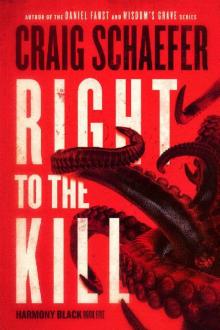 Right to the Kill (Harmony Black Book 5)
Right to the Kill (Harmony Black Book 5)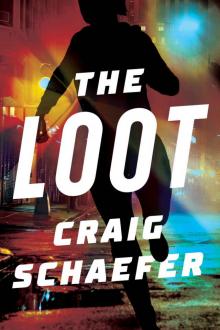 The Loot (Charlie McCabe Thriller)
The Loot (Charlie McCabe Thriller)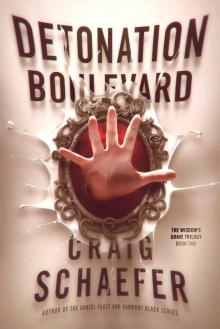 Detonation Boulevard
Detonation Boulevard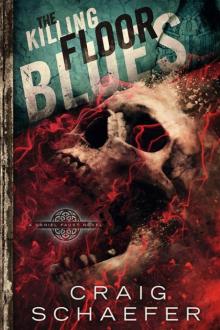 The Killing Floor Blues (Daniel Faust Book 5)
The Killing Floor Blues (Daniel Faust Book 5)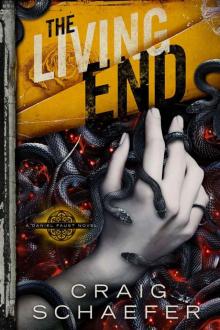 Daniel Faust 03 - The Living End
Daniel Faust 03 - The Living End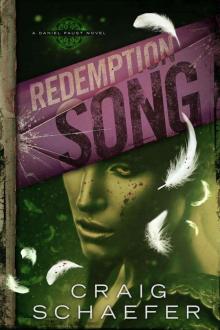 Redemption Song (Daniel Faust)
Redemption Song (Daniel Faust)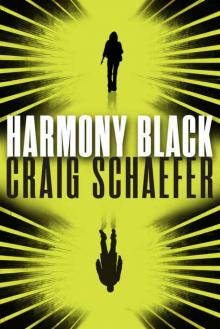 Harmony Black (Harmony Black Series Book 1)
Harmony Black (Harmony Black Series Book 1)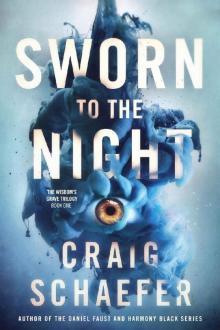 Wisdom's Grave 01 - Sworn to the Night
Wisdom's Grave 01 - Sworn to the Night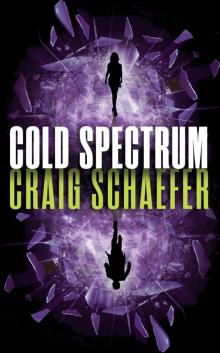 Cold Spectrum
Cold Spectrum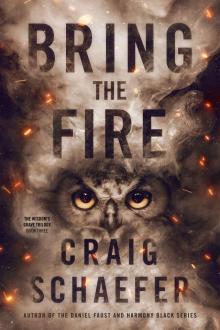 Bring the Fire (The Wisdom's Grave Trilogy Book 3)
Bring the Fire (The Wisdom's Grave Trilogy Book 3)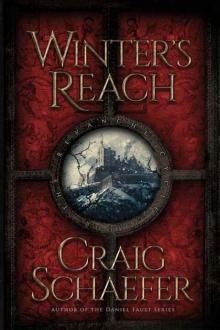 Winter's Reach (The Revanche Cycle Book 1)
Winter's Reach (The Revanche Cycle Book 1)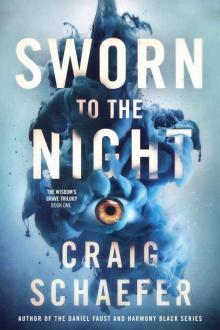 Sworn to the Night (The Wisdom's Grave Trilogy Book 1)
Sworn to the Night (The Wisdom's Grave Trilogy Book 1)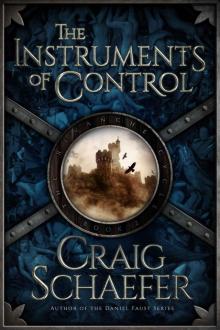 The Instruments of Control (The Revanche Cycle Book 2)
The Instruments of Control (The Revanche Cycle Book 2)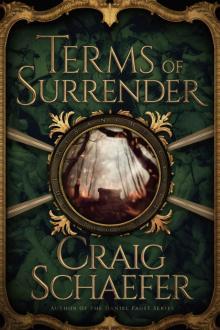 Terms of Surrender (The Revanche Cycle Book 3)
Terms of Surrender (The Revanche Cycle Book 3)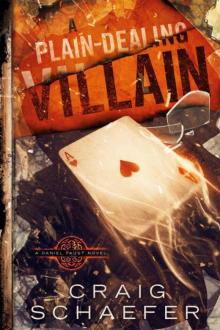 A Plain-Dealing Villain
A Plain-Dealing Villain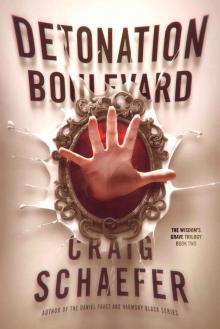 Detonation Boulevard (The Wisdom's Grave Trilogy Book 2)
Detonation Boulevard (The Wisdom's Grave Trilogy Book 2)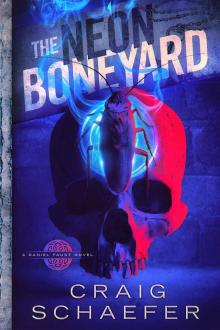 The Neon Boneyard
The Neon Boneyard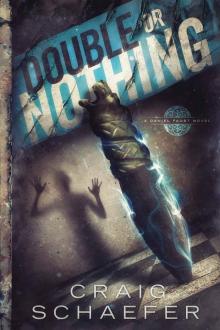 Double or Nothing (Daniel Faust Book 7)
Double or Nothing (Daniel Faust Book 7)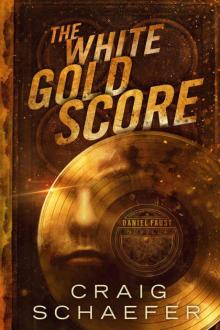 The White Gold Score (A Daniel Faust Novella)
The White Gold Score (A Daniel Faust Novella)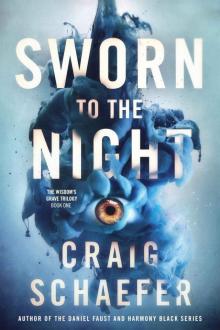 Sworn to the Night
Sworn to the Night